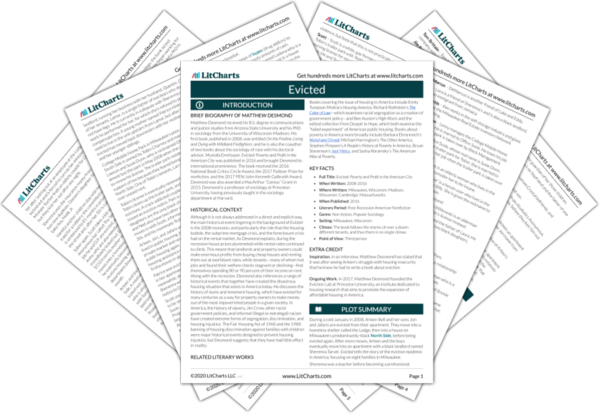Sherenna Tarver Quotes in Evicted
Sherrena saw all this, but she saw something else too. Like other seasoned landlords, she knew who owned which multifamily, which church, which bar, which street; knew its different vicissitudes of life, its shades and moods; knew which blocks were hot and drug-soaked and which were stable and quiet. She knew the ghetto's value and how money could be made from a property that looked worthless to people who didn't know any better.
Poor families were often compelled to accept substandard housing in the harried aftermath of eviction. Milwaukee renters whose previous move was involuntary were almost 25 percent more likely to experience long-term housing problems than other low-income renters.
When tenements began appearing in New York City in the mid-1800s, rent in the worst slums was 30 percent higher than in uptown. In the 1920s and ‘30s, rent for dilapidated housing in the black ghettos of Milwaukee and Philadelphia and other northern cities exceeded that for better housing in white neighborhoods. As late as 1960, rent in major cities was higher for blacks than for whites in similar accommodations. The poor did not crowd into slums because of cheap housing. They were there—and this was especially true of the black poor—simply because they were allowed to be.
"This moment right now," Sherrena reflected, "it’s going to create a lot of millionaires. You know, if you have money right now, you can profit from other people's failures. . . . I’m catching the properties. I'm catching ‘em."
In the 1960s and 1970s, destitute families often relied on extended kin networks to get by. Poor black families were "immersed in a domestic web of a large number of kin and friends whom they [could] count on," wrote the anthropologist Carol Stack in All Our Kin. Those entwined in such a web swapped goods and services on a daily basis. This did little to lift families out of poverty, but it was enough to keep them afloat. But large-scale social transformations—the crack epidemic, the rise of the black middle class, and the prison boom among them—had frayed the family safety net in poor communities. So had state policies like Aid to Families with Dependent Children that sought to limit "kin dependence" by giving mothers who lived alone or with unrelated roommates a larger stipend than those who lived with relatives.

Sherenna Tarver Quotes in Evicted
Sherrena saw all this, but she saw something else too. Like other seasoned landlords, she knew who owned which multifamily, which church, which bar, which street; knew its different vicissitudes of life, its shades and moods; knew which blocks were hot and drug-soaked and which were stable and quiet. She knew the ghetto's value and how money could be made from a property that looked worthless to people who didn't know any better.
Poor families were often compelled to accept substandard housing in the harried aftermath of eviction. Milwaukee renters whose previous move was involuntary were almost 25 percent more likely to experience long-term housing problems than other low-income renters.
When tenements began appearing in New York City in the mid-1800s, rent in the worst slums was 30 percent higher than in uptown. In the 1920s and ‘30s, rent for dilapidated housing in the black ghettos of Milwaukee and Philadelphia and other northern cities exceeded that for better housing in white neighborhoods. As late as 1960, rent in major cities was higher for blacks than for whites in similar accommodations. The poor did not crowd into slums because of cheap housing. They were there—and this was especially true of the black poor—simply because they were allowed to be.
"This moment right now," Sherrena reflected, "it’s going to create a lot of millionaires. You know, if you have money right now, you can profit from other people's failures. . . . I’m catching the properties. I'm catching ‘em."
In the 1960s and 1970s, destitute families often relied on extended kin networks to get by. Poor black families were "immersed in a domestic web of a large number of kin and friends whom they [could] count on," wrote the anthropologist Carol Stack in All Our Kin. Those entwined in such a web swapped goods and services on a daily basis. This did little to lift families out of poverty, but it was enough to keep them afloat. But large-scale social transformations—the crack epidemic, the rise of the black middle class, and the prison boom among them—had frayed the family safety net in poor communities. So had state policies like Aid to Families with Dependent Children that sought to limit "kin dependence" by giving mothers who lived alone or with unrelated roommates a larger stipend than those who lived with relatives.











